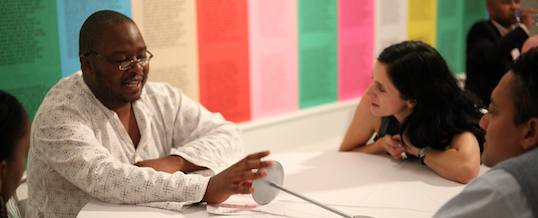
Will your kids know what to do in an emergency?
One of my recurring nightmares (probably influenced by television) is being in a critical, terrifyingly dangerous situation with my wife. In every episode of this nightmare she can’t see the danger coming and I’m forced to yell instructions to her — instructions on either what do do (“run!”) or what not to do (“stay still!”) Instead of trusting my judgement, she uncharacteristically turns around and starts arguing! She’s then promptly swallowed by the expanding chasm, or eaten by the devilish apparition, or run over by the demonically possessed dump truck. The agent of her death really isn’t important, it’s the fact that she felt more compelled to question me than to save her own life.
This dream sequence is actually funny because it’s not what my wife would do; she’s an instructor herself and would no doubt be an active participant in her rescue. But it underscores the anxiety we all have about those in our charge, the very people we want to most protect. Since I don’t have children the part of the recalcitrant family member is played by my wife; if I had kids, though, I’m sure they’d be the ones in my dream folding their arms and demanding an explanation. I know this because my friends have shared this exact dream with me and it was their kids who didn’t listen and perished.
Kids will be kids, but there’s a time and a place for that
During a dangerous incident is not when you want your children exercising their independence. They need to understand that it’s not the time for a temper tantrum or to ignore your instructions. I’ve witnessed even the best of kids do both of those at the most inopportune moments, but those were simply embarrassing. In a potentially lethal situation the results could be catastrophic.
The simplest (and probably the best) solution, if your children are of an appropriate size, is to simply scoop them up and head away from danger. Even then, a protesting and squirming child might impede your egress. It’s still important for them to learn how to behave when everything is on the line.
Can they be taught to do so? I think so, and after consulting with some experienced parents here’s what I’ve learned.
Trigger phrases
Teaching children “emergency words”, a very short phrase that you’ll use only when there is a real emergency and their life is in danger, is the first step. This is a phrase that they need to be able to recognize, will understand, and which tells them that they absolutely must stop what they’re doing and follow your instructions to the letter.
The emergency words are combined with what’s known as “compliance” or “command” voice: a combination of tone, emphasis, and facial expressions that is used only when the situation is truly dire and which underscores your expectation of attention. The facial expressions alone might be used if voice communication isn’t practical, and your family should also become accustomed to what “that look” means.
Your kids need to know that if you use the emergency words they may experience something very scary. At the same time, they need to be reassured that you’re going to protect them from the scary thing, and that you can only protect them if they do what you tell them to do. The emergency words are their cue to listen to your instructions.
Whatever phrase you pick, your emergency words need to be innocuous to the general public and not at all likely to ever come up in any normal conversation. You should also let your kids know that you might whisper the emergency words or yell them; in either case, they need to understand that they’re to respond the same way regardless of the implied urgency.
Emergency drills
Once you’ve established the emergency words you need to have drills so that kids can learn to recognize and respond properly. Telling them the emergency words and expecting them to remember what to do a year or two later isn’t realistic! Have an emergency words drill every few months — combine it with a fire drill and get double the value. The important thing is to get the children used to the idea of calmly following your instructions even if they’re tired, hungry, or scared.
Resist the tendency for your drills to turn into games. You need to impress on the children that this is serious business, and they need to take it seriously.
Don’t cheat!
I’ve watched exasperated parents trying to get their children under control in social settings, with all kinds of nonsense being the result. It might be tempting, when one of your little darlings is having one of “those” days, to use the emergency words “just this once” to get them to straighten up. Don’t do that! Your emergency words need to be reserved strictly for emergencies; if you cheat and use them as a manipulation ploy when they’re not justified, it won’t take long for your children to learn that they don’t really need to listen to you because there isn’t a real emergency. Don’t cheat, and don’t use your emergency words for anything but their immediate safety.
After the incident
You may need to use the emergency words in cases where the danger isn’t immediately obvious to your kids. In those cases, calmly explain to them what the danger was and why it was necessary to invoke the emergency procedure. Explain what could have happened had they not followed your instructions, and reassure them that they did the right thing and that you’re proud of their response.
Keeping your kids under control during an incident is critical to everyone’s safety. Understanding the proper role of emergency words, and using them properly, can go a long way to keeping you from actually living your nightmares.
Grant Cunningham
photo by Ryan McGuire
You can LISTEN to this blog post!
- Posted by Grant Cunningham
- On October 14, 2016



